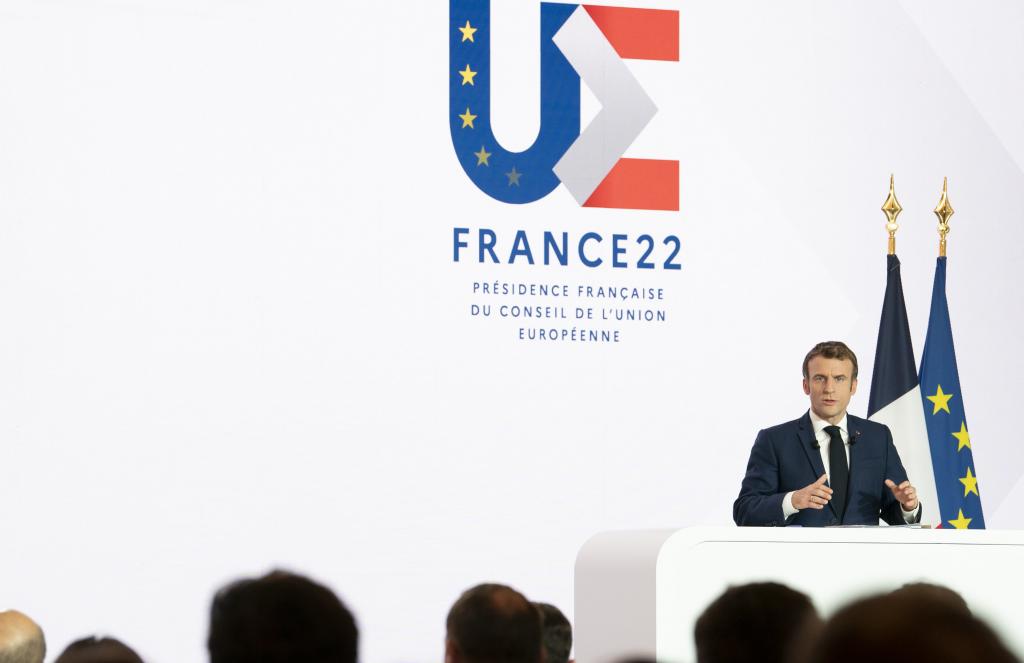Thessaloniki gets ready for its metro launch in November
The underground rapid transit lines have been under construction for almost two decades due to various project delays
 TheMayor.EU logo
TheMayor.EU logo 
President of France Emmanuel Macron gives a press conference on the upcoming EU Presidency on 9 December, Source: Ghislain Mariette, Présidence de la République
Here is an overview of the country’s priorities for the next 6 months
On 1 January France assumes the rotating Presidency of the Council of the European Union (also, the Council of Ministers or simply The Council) for a period of six months. The programme includes over 400 events across the country and the EU, with a political, cultural and citizen dimension. In this context, in early December, French President Emmanuel Macron outlined the key priorities for the period between 1 January and 30 June 2022, that his country will put forward.
Tomorrow, France assumes the EU Presidency for the 13th time since 1959. The country holding the EU Presidency has to organise and chair meetings, ensure compromises, deliver conclusions and ensure the consistency and continuity of the decision-making process. Moreover, it ensures good cooperation between all Member States.
As per the established EU practise to ensure continuity in policy, the Presidency is organised in trios – periods of 1.5 years, in which three countries work together on a common programme.
France will thus be the first of the trio, followed by Czechia in the second half of 2022 and Sweden from 1 January 2023 to 30 June 2023, accordingly. As approved by the General Affairs Council and outlined on the official website of FRANCE22, the priorities for the next 18 months are as follows:
The program also reiterates the European Union's commitment to the fight against the Covid-19 pandemic and its economic and social consequences.
Naturally, for the next 6 months, France has its own agenda and priorities, in line with the broader framework of the trio. Said agenda has been in the making since 2017, when the President of France gave a speech at the Sorbonne, speaking of a sovereign Europe, capable of defending its values and interests.
Now, the focus will be on three areas: climate, social, digital. It follows then that France will seek:
In addition, France will pursue a new investment model for the EU and the Eurozone, stronger instruments to promote democracy, the expansion of the Erasmus+ programme, enlightening the EU debate with a Europe Academy, as well as the establishment of a genuine joint research agency.
Finally, the Presidency will unfold under the motto Recovery, Strength and a Sense of Belonging. The notions refer to the idea of strengthening the economy to enable Europe to support the ecological and digital transitions; defending and promoting its own values and interests, and building a shared vision through culture, our shared values and common history.

The underground rapid transit lines have been under construction for almost two decades due to various project delays

Now you can get your wine in Talence by paying directly in Bitcoin

That’s because the state has to spend money on updating the railway infrastructure rather than subsidizing the cost of the popular pass

Rethinking renewable energy sources for the urban landscape

The examples, compiled by Beyond Fossil Fuels, can inform and inspire communities and entrepreneurs that still feel trepidation at the prospect of energy transition

Now you can get your wine in Talence by paying directly in Bitcoin

The 10th European Conference on Sustainable Cities and Towns (ESCT) sets the stage for stronger cooperation between the EU, national and local level to fast track Europe's transition to climate neutrality.

At least, that’s the promise made by the mayor of Paris, Anne Hidalgo

The underground rapid transit lines have been under construction for almost two decades due to various project delays

At least, that’s the promise made by the mayor of Paris, Anne Hidalgo

Hostal de Pinós is located in the geographical centre of the autonomous region

Despite its church-y name, the district has long been known as the hangout spot for the artsy crowds

Urban dwellers across the EU are having a say in making their surroundings friendlier to people and the environment.

Forests in the EU can help green the European construction industry and bolster a continent-wide push for architectural improvements.

Apply by 10 November and do your part for the transformation of European public spaces

An interview with the Mayor of a Polish city that seeks to reinvent itself

An interview with the newly elected ICLEI President and Mayor of Malmö

A conversation with the Mayor of Lisbon about the spirit and dimensions of innovation present in the Portuguese capital














